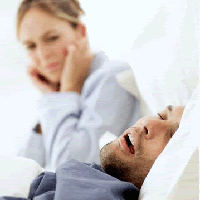A good night’s sleep is
very important to face another new day afresh and energetic. Disturbed or
improper sleep leaves you tired when you wake up in the next morning and keeps
you unenergetic throughout the day causing hindrance to your activities.
What is Sleep apnea?
Sleep apnea is a
condition where your airway is obstructed or interrupted while you are asleep.
These breathing pauses may last for 10-20 seconds and might repeat several
times during the sleep disturbing your natural sleep. As a result you end up
having insufficient deep sleep.
The most common sleep
apnea is Obstructive Sleep Apnea where the airway is blocked during sleep.
During normal breathing the air passes through the airway which remains open.
The airway consists of nose, mouth, throat and windpipe. In obstructive sleep
apnea, the airway is collapsed and blocked. When you breathe in, the air tries
to squeeze in through this narrowed air passage, which leads to snoring.
When the airway is
blocked, there is little or no air flowing to the lungs leading to decreased
blood oxygen levels. This in turn signals your brain to disturb your sleep to
open up the airway. The normal breathing continues till the next episode of
obstruction.
The biggest challenge is
to identify the disorder and treat it appropriately. This condition can lead to
many serious health problems such as high blood pressure, heart disease, and
stroke. Proper diagnosis and treatment can prevent all the ill effects and help
you lead a quality life.
What is Snoring?
Snoring is an obnoxious
noise which is caused when inhaled air passes through the narrow airway.
Generally, Long uvula or large tongue increases the speed and pressure of the
inhaled air causing the soft tissues of the throat to vibrate. Snoring could be
a symptom of sleep apnea but, not always.
There are various
treatment modalities to treat these conditions:
- Bringing some changes to our
lifestyle like losing weight, quit smoking, avoid alcohol and heavy meals
at least 2-3 hours prior to sleep and maintain regular sleep hours.
- Using alternate breathing
devices like CPAP which is Continuous Positive Airflow Pressure used to
treat moderate to severe apnea. CPAP is a mask like device which provides
a constant stream of air that keeps your breathing passages open during
sleep.
- Other treatment method include
surgical correction of anatomical obstructions like flabby tongue,
excessive tissue in the throat, nasal obstruction, enlarged uvula or
tonsils that cause sleep apnea.
Dentist’s role in
treating sleep apnea:
You must be wondering
what role a dentist plays in treating a medical condition.
Oral appliances are
effective in treating mild to moderate apnea. Oral appliance is a small plastic
device which fits in mouth just like a mouth guard or a retainer. It helps
prevent the tongue and the soft tissues to fall back and thus prevent the
obstruction of airway.
There are mainly two
types of devices, one which is Tongue retaining appliance which holds the
tongue in a forward position using a suction bulb and prevents the tongue to
fall back during sleep, thus preventing the airway obstruction. Another is the
Mandibular repositioning appliance which reposition and maintains the lower jaw
in the protruded position thus pulling the tongue forward and opens the airway
indirectly.
Early diagnosis and
treatment of the condition is very important to prevent any ill effects caused
by sleep apnea.

No comments:
Post a Comment